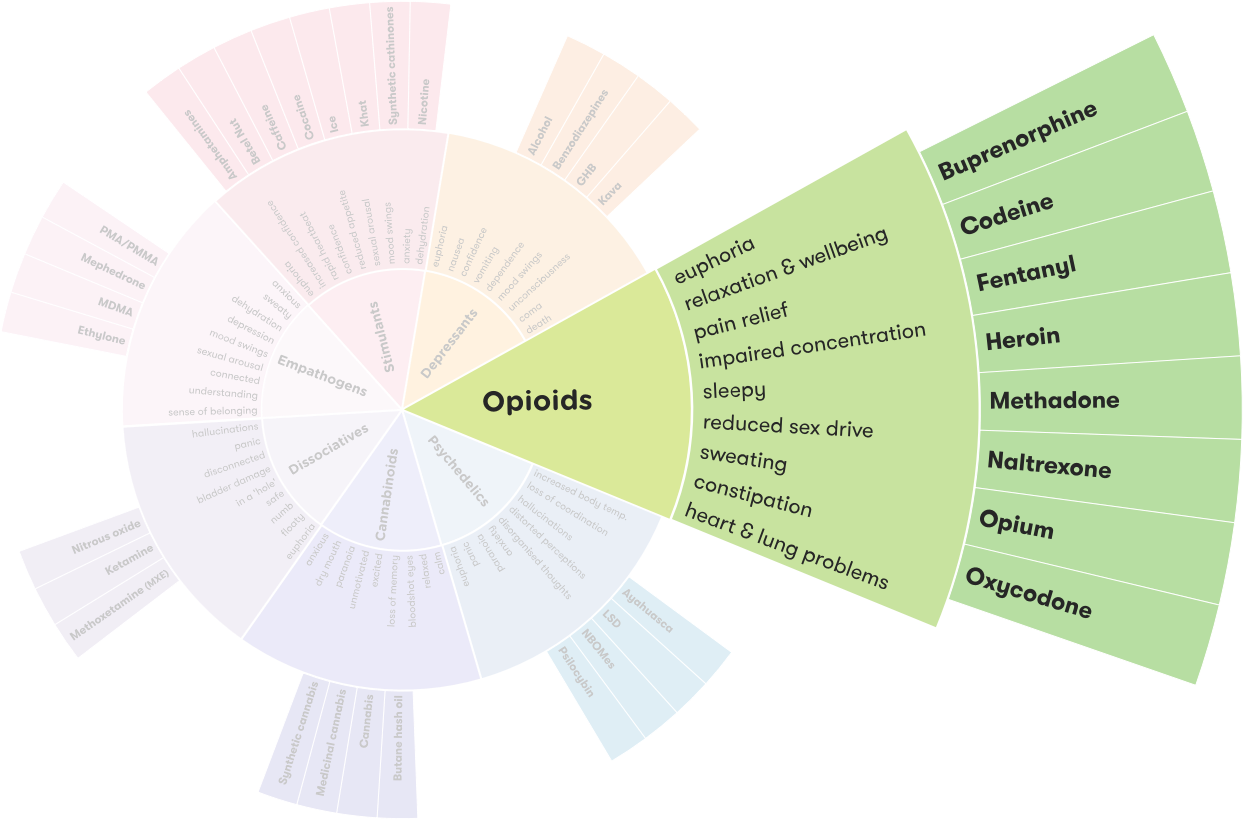Opium

Last published: November 23, 2023
What is opium?
Opium is a depressant drug, which means it slows down the messages travelling between your brain and body. It is derived from the opium poppy (Papaver somniferum L.) and is one of the earliest plants recorded for medicinal use.1 Evidence of opium cultivation by the Sumerian people dates to 3400BCE, although some scholars believe opium use predates Sumerian culture.2
Opium poppy pods hold a milky substance called latex that contains a number of chemicals, including morphine and codeine.1 Latex is extracted from the opium pods and dried to create opium. Typically, it is be further refined by boiling and drying again.1, 2
What does it look like?
Opium is a sticky dark-brown gum with a strong odour. It can also be manufactured into a liquid or powder.1, 2
Slang names
Aunti, Aunti Emma, Big O, O, Black pill, Chandu, Chinese Molasses, Dopium, Dream Gun, Fi-Do-Nie, Gee, Guma, Midnight Oil, Zero.
Other types of opioids
How is opium used?
Opium can be smoked, eaten raw or as a pill, or made into a tincture for drinking.1, 2
Opium can also be manufactured into heroin and is a prerequisite for heroin production.
Effects of opium
There is no safe level of drug use. Use of any drug always carries some risk. It’s important to be careful when taking any type of drug.
Opium affects everyone differently, based on:
- the person’s size, weight and health
- regularity of use
- whether other drugs are taken around the same time
- the amount taken
- the strength of the drug (which varies between batches).
Short term effects may include:
- euphoria
- relaxation
- analgesia (pain relief)
- slower, shallower breathing
- lower heart rate
- impaired reflexes
- temporary constipation · loss of appetite.3, 4
Overdose
If you take a large amount of opium, you could overdose. Call an ambulance straight away by dialling triple zero (000) if you or another person have any of these symptoms (ambulance officers don’t need to involve the police):
Symptoms of opium overdose:
- very slow breathing
- loss of consciousness
- tiny pupils.5
Untreated overdose can lead to brain damage and death.
Long-term effects
Regular use of opium may cause:
- tolerance - needing to use more to get the same effect
- irregular periods and difficulty having children
- loss of sex drive
- constipation · dependence on opium.3, 4
Mixing opium and other drugs
Mixing opium with other drugs can have unpredictable effects and increase the risk of harm.
- Opium and nitrous oxide (nangs): can increase the risk of unconsciousness and blackouts.
- Opium and methamphetamines/cocaine: can increase the risk of heart strain.
- Opium and alcohol/benzodiazepines/ketamine/GHB: can increase sedation and lead to unconsciousness, choking on vomit, and possible death.6,7
Reducing harm
There are ways in which you can reduce the risks associated with using opium:
- always carry naloxone for emergencies, and encourage family and friends to learn how to use take home naloxone – a medicine that can reverse the effects of an opioid overdose (more information on naloxone is provided below) · avoid mixing drugs (polydrug use) – mixing opioids with depressant drugs such as alcohol or benzodiazepines can greatly increase the risk of overdose
- don’t use opioids alone and always tell someone what you’ve taken
- if using illicit opioids, always test a small amount to reduce overdose risk
- do not drive or operate machinery after use
- always use clean needles and never share injecting equipment
- safely dispose of used injecting equipment
Withdrawal
Giving up opium after using it for a long time is challenging because the body must get used to functioning without it. Withdrawing from opium is similar to withdrawing from other opioid drugs.
Withdrawal symptoms usually start six to 24 hours after the last dose and can last around seven to ten days. These symptoms are described as flu-like, and can include:
- restlessness and irritability
- insomnia
- depression and crying
- diarrhoea
- sweating
- restless sleep
- muscle cramps
- nausea and vomiting
- fast heartbeat.8
Opium and lead poisoning
- Some opium has been found to be contaminated with lead. The source of lead in opium is still unclear, possibly due to contamination from equipment used to process the opium, intentional adulteration of opium with lead to increase its weight, or from growing opium poppies in contaminated soil.9, 10
- Lead poisoning can have a serious effect on people’s health, including organ damage.11
Opium and the law
Opium is illegal in Australia. Federal and state laws provide penalties for possessing, using, cultivating or selling opium, or driving under its influence.
Opium statistics
Current statistics on opium use in Australia are unknown.
Getting help
If your use of opium is affecting your health, family, relationships, work, school, financial or other life situations, or you’re concerned about a loved one, you can find help and support.
Call the National Alcohol and Other Drug Hotline on 1800 250 015 for free and confidential advice, information and counselling about alcohol and other drugs
Help and Support Services search
Find a service in your local area from our list. Simply add your location or postcode and filter by service type to quickly discover help near you.
If you're looking for other information or support options, send us an email at druginfo@adf.org.au
Path2Help
Not sure what you are looking for? Try our intuitive Path2Help tool and be matched with support information and services tailored to you.
Find out more
- Presley CC, Lindsley CW. DARK Classics in Chemical Neuroscience: opium, a historical perspective. ACS Chemical Neuroscience. 2018;9(10):2503-18.
- Booth M. Opium: a history. London: Simon & Schuster Ltd; 1996.
- Parrott A, Morinan A, Moss M, Scholey A. Understanding drugs and behaviour. West Sussex: John Wiley & Sons Ltd; 2004.
- Kalant H. Opium revisited: a brief review of its nature, composition, non-medical use and relative risks. Addiction. 1997;92(3):267-77.
- World Health Organisation. Information sheet on opioid overdose Online: World Health Organisation; 2018
- Psychonaut Wiki. Opium 2022 [cited: 17.03.2022].
- Release UK. Opium Harm Reduction 2022 {cited: 17.03.2023].
- Brands B, Sproule B, Marshman J. Drugs & Drug Abuse. Toronto: Addiction Research Foundation; 1998.
- Soltaninejad K, Flueckiger A, Shadnia S. Opium addiction and lead poisoing. Journal of Substance Use. 2011;16(3):208-12.
- Hayatbakhsh M, Oghabian Z, Conlon E, Nakhaee S, Amirabadizadeh A, Zahedi M, et al. Lead poisoning among opium users in Iran: an emerging health hazard. Substance Abuse Treatment, Prevention, and Policy. 2017;12(43).
- World Health Organisation. Lead poisoning and health Online2019
Explore opioids on the Drug Wheel
